SpringMVC执行流程及源码分析
SpringMVC流程及源码分析
前言
学了一遍SpringMVC以后,想着做一个总结,复习一下。复习写下面的总结的时候才发现,其实自己学的并不彻底、牢固、也没有学全,视频跟书本是要结合起来一起,每一位老师的视频可能提到的东西都不一致,也导致也不是很全面,书本上会讲的笔记系统、全面。同时我自己也是一个初学者,下面总结的可能并不完善、正确,希望看到的大神给我指出,在此非常感谢。
- SpringMVC流程及源码分析
- 一 、Spring核心模块
- 二、SpringMVC流程及原理
- 二、源码分析
- 三、引用参考资料
一 、Spring核心模块
1、核心模块
Spring Web MVC (下文简称为 SpringMVC )是 Spring 提供 Web 应用的框架设计,属于表现层的框架。SpringMVC是Spring框架的一部分。
Spring框架包括大致六大模块,核心容器(Core Container)、AOP和设备支持、数据访问及集成、Web、报文发送、Test
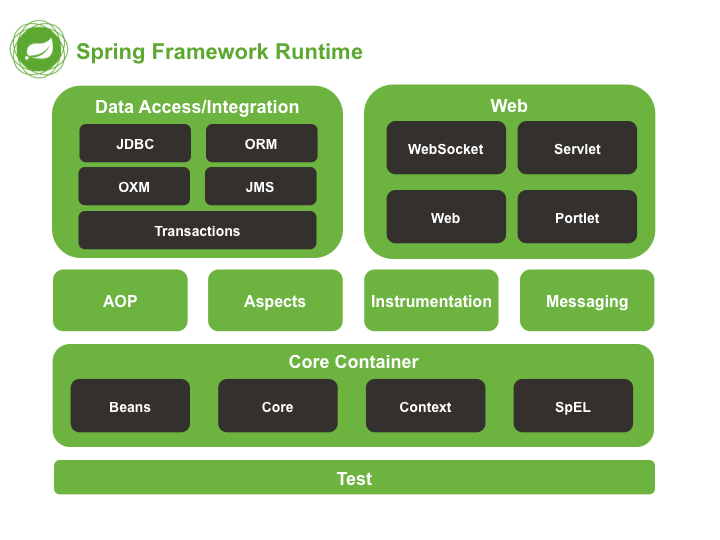
图片来源于Spring官网5.0.0.M5:
对于Spring5模块图,有2点疑问:
1、不清楚为什么在Spring官网上5.0版本以后,Release版(稳定版)的都未找到模块图,但是在M(里程碑版)版找到 了,如果有人在5.0以后的Release版(稳定版)找到,麻烦给我留个言,谢谢。
2、在其他博文中看到Spring5模块结构图是这样的:
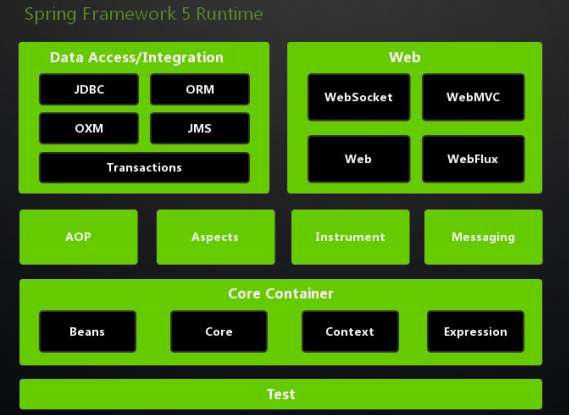
挺奇怪这个图是哪里来的?(路过的大神请指点)
对于问题2,我在Spring5.2.13.RELEASE GA中,找到了如下所示信息:
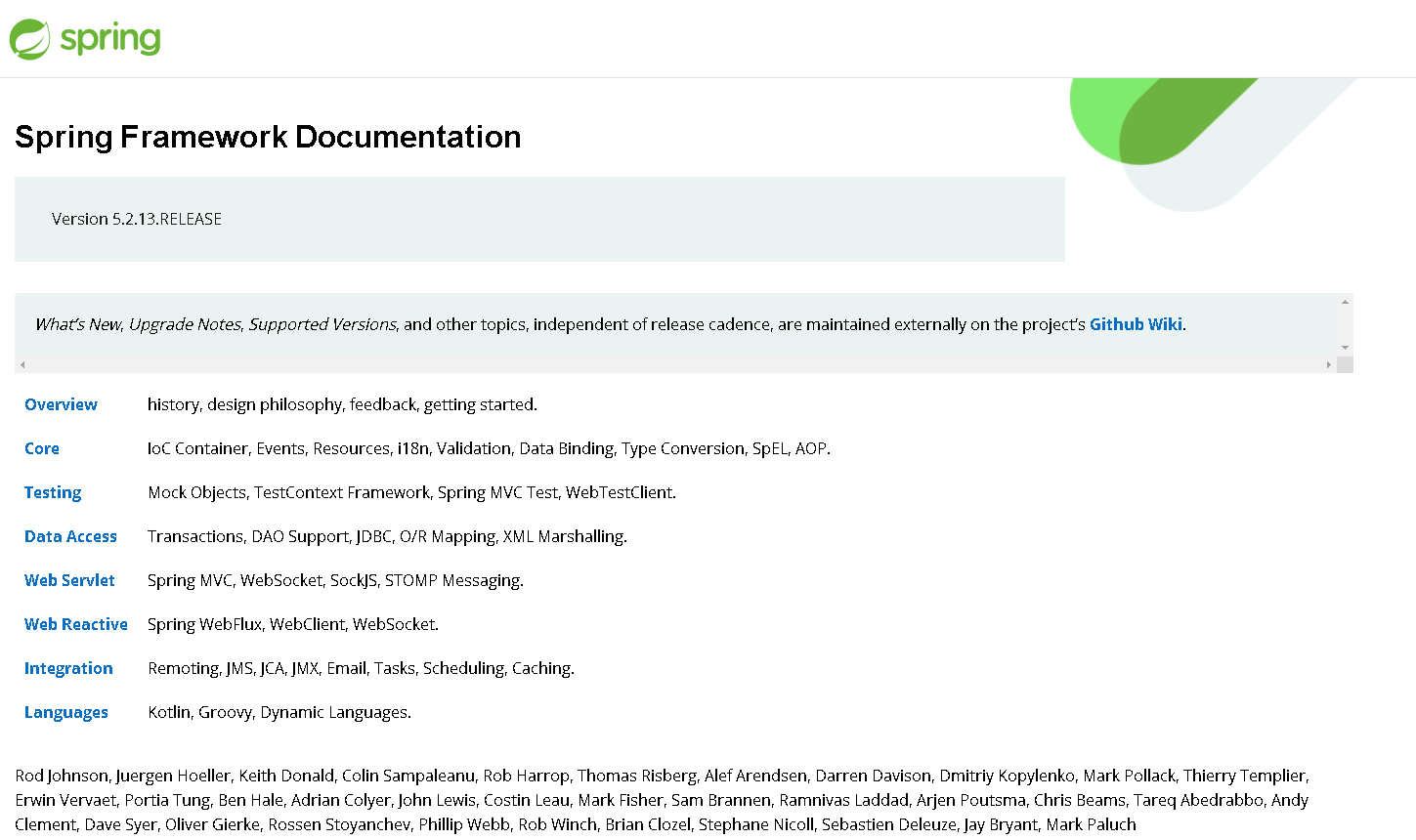
拷贝以上信息:
Spring Framework Documentation
Version 5.2.13.RELEASE
What’s New, Upgrade Notes, Supported Versions, and other topics, independent of release cadence, are maintained externally on the project’s Github Wiki.
| Overview | history, design philosophy, feedback, getting started. |
|---|---|
| Core | IoC Container, Events, Resources, i18n, Validation, Data Binding, Type Conversion, SpEL, AOP. |
| Testing | Mock Objects, TestContext Framework, Spring MVC Test, WebTestClient. |
| Data Access | Transactions, DAO Support, JDBC, O/R Mapping, XML Marshalling. |
| Web Servlet | Spring MVC, WebSocket, SockJS, STOMP Messaging. |
| Web Reactive | Spring WebFlux, WebClient, WebSocket. |
| Integration | Remoting, JMS, JCA, JMX, Email, Tasks, Scheduling, Caching. |
| Languages | Kotlin, Groovy, Dynamic Languages. |
按照以上信息的Web Servlet、Web Reactive已经是分属于不同的模块了。
- Web Servlet:Spring MVC, WebSocket, SockJS, STOMP Messaging.
- Web Reactive:Spring WebFlux, WebClient, WebSocket.
Spring官方文档:https://spring.io/projects/spring-framework#learn/
2、Spring版本命名规则(补充)
上面提到了Spring又不同的版本,在此记录一下各个版本的意义。
| 描述方式 | 说明 | 含义 |
|---|---|---|
| Snapshot | 快照版 | 尚不稳定,仍处于开发中的版本 |
| Release | 稳定版 | 功能相对稳定,可以对外发行,但有时间限制 |
| GA | 正式版 | 代表广泛可用的稳定版(General Availability) |
| M | 里程碑版 | (M是Milestone的意思)具有一些全新的功能或是有意义的版本 |
| RC | 终测版 | Release Candidate(最终测试),即将作为正式版发布 |
二、SpringMVC流程及原理
1、执行流程
SpringMVC执行流程图
 图片来源:三、引用参考资料
图片来源:三、引用参考资料
1.1、执行流程
01、用户发送出请求到前端控制器(中央处理器)DispatcherServlet进行处理。
02、前端控制器DispatcherServlet收到请求后,调用处理器映射器HandlerMapping。
03、处理器映射器HandlerMapping(处理器映射器)根据request请求的URL等信息查找能够进行处理的Handler,以及相关拦截器interceptor,并构造HandlerExecutionChain执行链,然后将构造好的HandlerExecutionChain执行链对象返回给前端控制器DispatcherServlet。
04、前端控制器DispatcherServlet根据处理器映射器HandlerMapping的
05、处理器适配器HandlerAdapter经过适配调用具体的处理器(Handler/Controller),即业务中自己写的Controller。
06、Controller处理完后返回ModelAndView(springmvc的封装对象,将model和view封装在一起)给处理器适配器HandlerAdapter;
07、处理器适配器HandlerAdapter将Controller执行结果ModelAndView返回给前端控制器DispatcherServlet。
08、前端控制器DispatcherServlet调用视图解析器ViewReslover处理ModelAndView。
09、视图解析器ViewReslover解析后根据逻辑视图名解析成物理视图名即具体的页面地址,生成并返回具体对象View(springmvc封装对象,是一个接口)。
10、前端控制器DispatcherServlet根据对象View进行视图渲染,填充Model。
11、前端控制器DispatcherServlet向用户返回响应
1.2、执行流程说明:
1.2.1、第02、03说明
(1) 处理器映射器:springmvc框架中的一种对象,框架把实现了HandlerMapping接口的类都叫做映射器(多个);
(2) 处理器映射器作用:根据请求,从springmvc容器对象中获取处理器对象(MyController controller = ctx.getBean("some")
(3) 框架把找到的处理器对象放到一个叫做处理器执行链(HandlerExecutionChain)的类保存
(4) HandlerExecutionchain:类中保存着
a:处理器对象(MyController);
b:项目中的所有的拦截器List
(5) 方法调用:HandlerExecutionChain mappedHandler - getHandler (processedRequest);
1.2.2、第04说明
(1) HandlerExecutionChain执行链找到对应的处理器映射器HandlerAdapter。
(2) 处理器适配器:springmvc框架中的对象,需要实现HandlerAdapter接口,
(3) 处理器适配器作用:执行处理器方法(调用MyController.doSome()得到返回值ModelAndView )
(4) 前端控制器中调用适配器:HandlerAdapter ha =getHandlerAdapter (mappedHandler.getHandler());
(5) 执行处理器方法:mv= ha.handle (processedRequest, response, mappedHandler.getHandler());
第08说明:
(1) 视图解析器:springmvc中的对象,需要实现ViewResoler接口(可以有多个)
(2) 视图解析器作用:组成视图完整路径,使用前缀,后缀。并创建View对象。
(3) view是一个接口,表示视图的,在框架中jsp,htm1不是string表示,而是使用view和他的实现类表示视图。
InternalResourceview:视图类,表示jsp文件,视图解析器会创建InternalResourceView类对象。 这个对象的里面,有一个属性url-/WEB-INF/view/show.jsp
1.2.2、SpringMVC组件说明
- (1). 前端控制器(DispatcherServlet):接收请求,响应结果,相当于电脑的CPU。
- (2). 处理器映射器(HandlerMapping):根据URL去查找处理器.
- (3). 处理器(Handler):(需要程序员去写代码处理逻辑的).
- (4). 处理器适配器(HandlerAdapter):会把处理器包装成适配器,这样就可以支持多种类型的处理器,类比笔记本的适配器(适配器模式的应用).
- (5). 视图解析器(ViewResovler):进行视图解析,多返回的字符串,进行处理,可以解析成对应的页面.
1.2.3、SpringMVC详细流程图
综上所述,总结下SpringMVC的详细流程图:
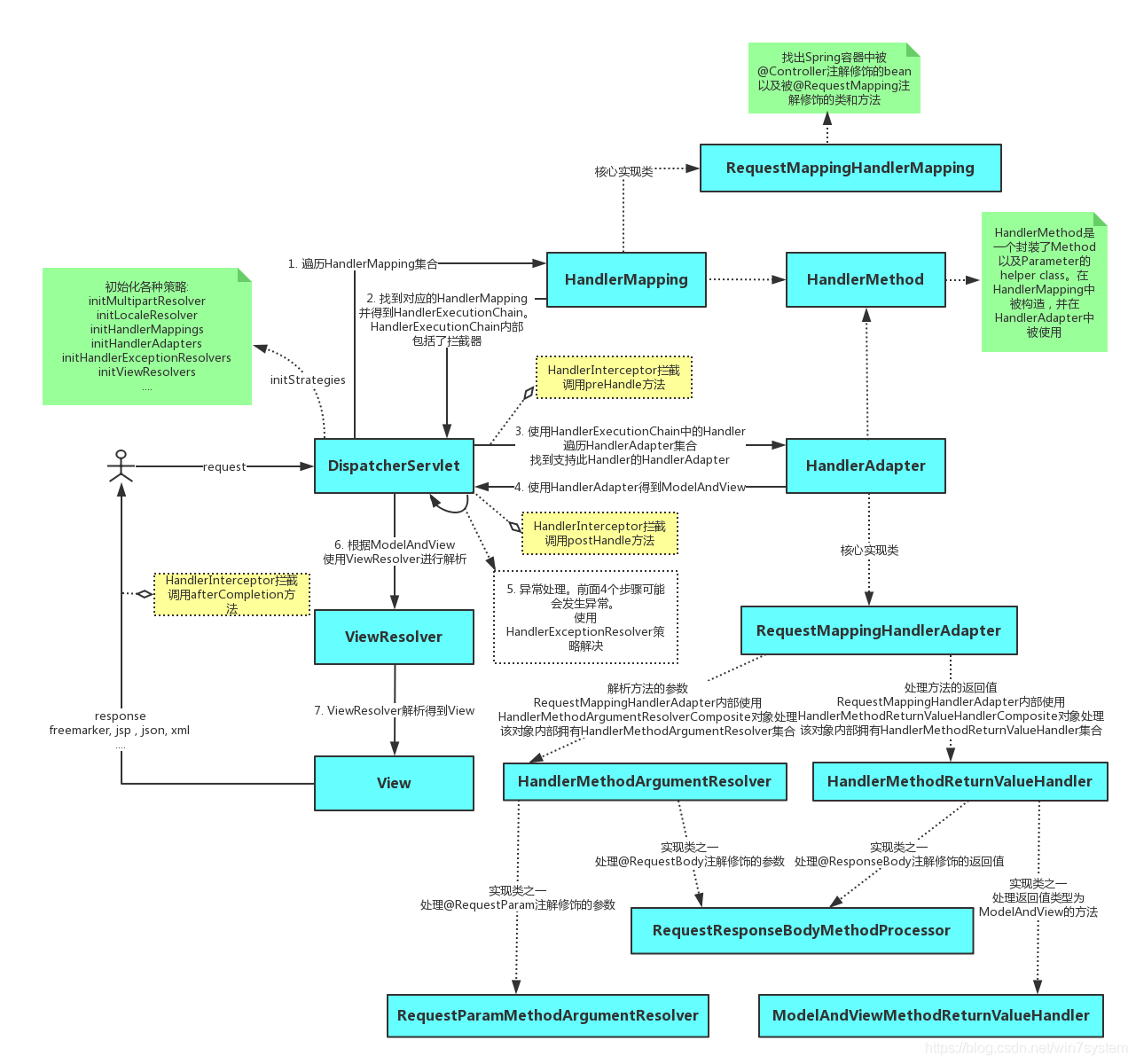
图片来源:三、引用参考资料
二、源码分析
以下源码来源jar包:spring-webmvc-5.25.RELEASE.jar
1、初始化
1.1、ApplicationContext
ApplicationContext初始化入口类:ApplicationObjectSupport的setApplicationContext方法,setApplicationContext方法中核心部分就是初始化容器initApplicationContext(context),子类AbstractDetectingUrlHandlerMapping实现了该方法。
类图:

UML图:
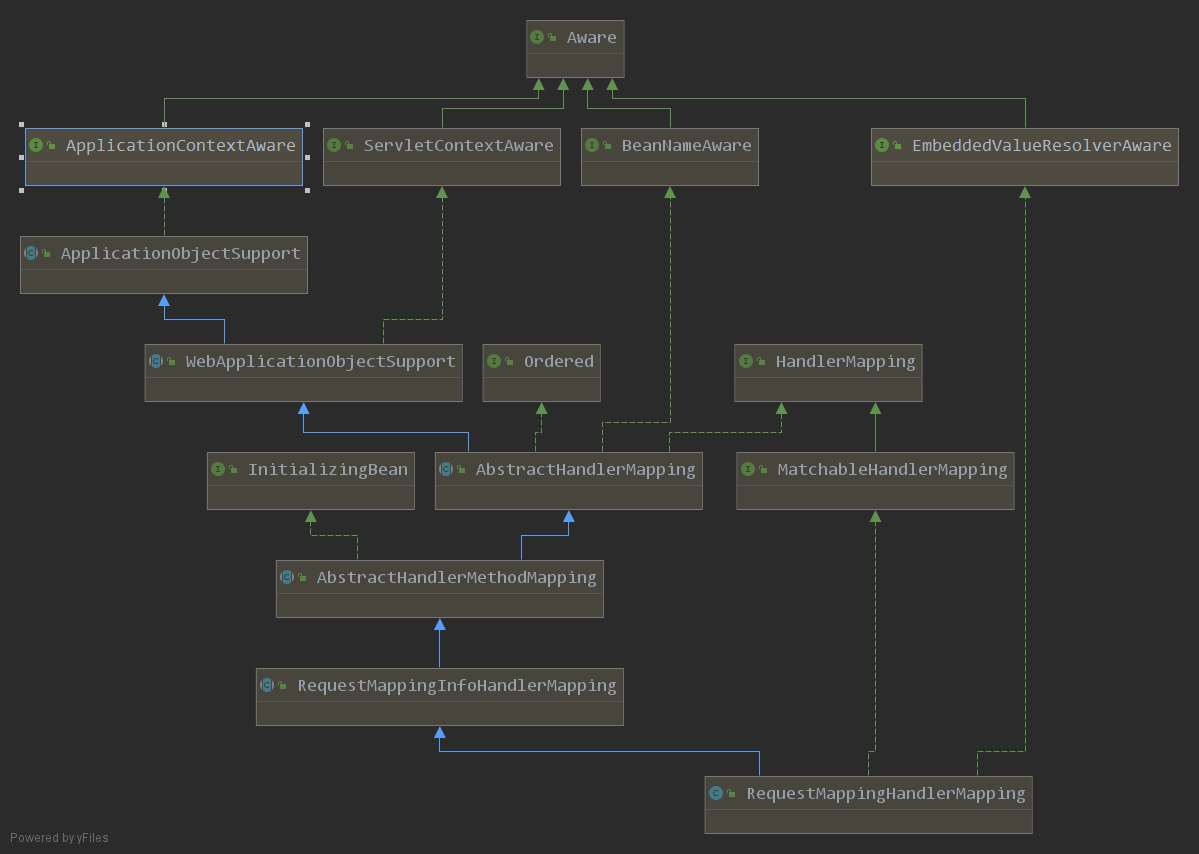
RequestMappingHandlerMapping ,用于注解@Controller,@RequestMapping来定义controller.
初始化时,3个类的大致分工如下:
- AbstractHandlerMethodMapping定义整个算法流程;
- RequestMappingInfoHandlerMapping提供匹配条件RequestMappingInfo的解析处理;
- RequestMappingHandlerMapping根据@RequestMapping注解生成 RequestMappingInfo,同时提供isHandler实现
2、前端控制器(中央处理器)DistepcherServlet
从上面的流程图可以看到前端控制器(中央处理器)DistepcherServlet是SpringMVC核心,查看DistepcherServlet类的继承情况。
UML图:
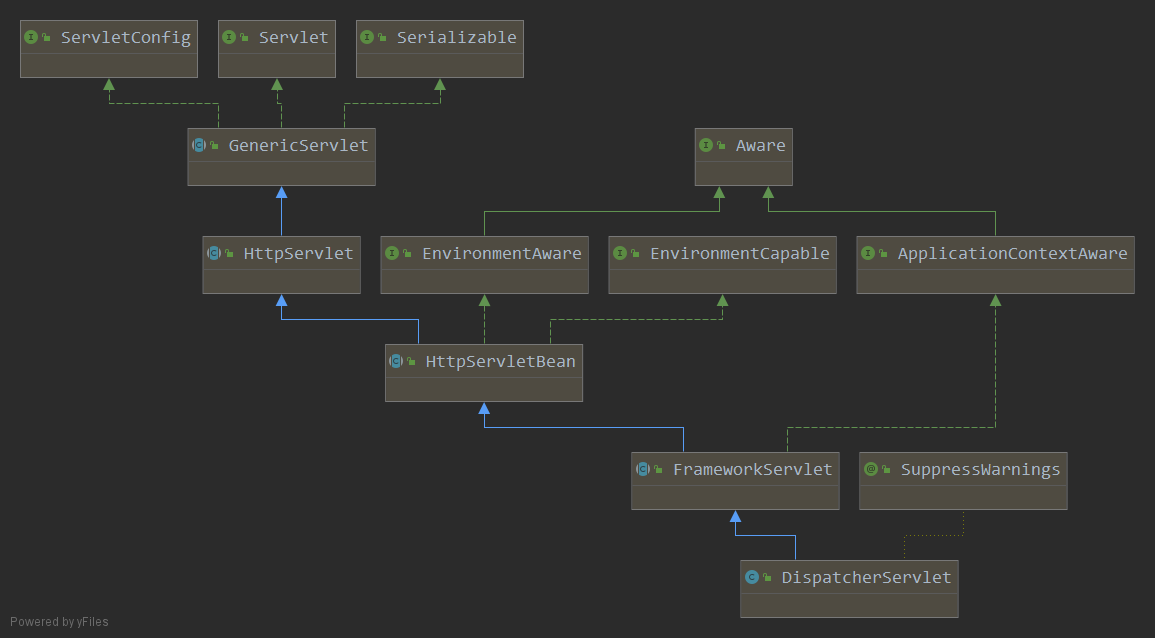
从继承关系看出:
DistepcherServlet ---> FrameworkServlet ---> HttpServletBean---> HttpServlet
那就说明DistepcherServlet 类也是一个Servlet类,那最终核心的方法就是service()方法,即Servlet的核心方法。
那就找service()方法,在DistepcherServlet中没有servic()方法,在父类FrameworkServlet有service()方法,源码如下:
来源:
org.springframework.web.servlet.FrameworkServlet.service(HttpServletRequest request, HttpServletResponse response)
/*** Override the parent class implementation in order to intercept PATCH requests.*/@Overrideprotected void service(HttpServletRequest request, HttpServletResponse response)throws ServletException, IOException {HttpMethod httpMethod = HttpMethod.resolve(request.getMethod());if (httpMethod == HttpMethod.PATCH || httpMethod == null) {processRequest(request, response);}else {super.service(request, response);}}
可以看到:
FrameworkServlet.service(HttpServletRequest request, HttpServletResponse response)拿到request请求,判断当前请求是否是PATCH请求,不是的就调用父类的servic()方法,掉用父类中的service方法就是去调用该类中doPost(),doGet()方法,根据不同的请求方式然后走doPost()或者doGet(),调用中以doGet()为例,
FrameworkServlet类的doGet()源码:
/*** Delegate GET requests to processRequest/doService.* <p>Will also be invoked by HttpServlet's default implementation of {@code doHead},* with a {@code NoBodyResponse} that just captures the content length.* @see #doService* @see #doHead*/@Overrideprotected final void doGet(HttpServletRequest request, HttpServletResponse response)throws ServletException, IOException {processRequest(request, response);}
doGet()又调用FrameworkServlet类中的processRequest(request, response);
/*** Process this request, publishing an event regardless of the outcome.* <p>The actual event handling is performed by the abstract* {@link #doService} template method.*/protected final void processRequest(HttpServletRequest request, HttpServletResponse response)throws ServletException, IOException {long startTime = System.currentTimeMillis();Throwable failureCause = null;LocaleContext previousLocaleContext = LocaleContextHolder.getLocaleContext();LocaleContext localeContext = buildLocaleContext(request);RequestAttributes previousAttributes = RequestContextHolder.getRequestAttributes();ServletRequestAttributes requestAttributes = buildRequestAttributes(request, response, previousAttributes);WebAsyncManager asyncManager = WebAsyncUtils.getAsyncManager(request);asyncManager.registerCallableInterceptor(FrameworkServlet.class.getName(), new RequestBindingInterceptor());initContextHolders(request, localeContext, requestAttributes);try {doService(request, response);}catch (ServletException | IOException ex) {failureCause = ex;throw ex;}catch (Throwable ex) {failureCause = ex;throw new NestedServletException("Request processing failed", ex);}finally {resetContextHolders(request, previousLocaleContext, previousAttributes);if (requestAttributes != null) {requestAttributes.requestCompleted();}logResult(request, response, failureCause, asyncManager);publishRequestHandledEvent(request, response, startTime, failureCause);}}
processRequest(request, response)方法中最关键的又调用了doService(request, response);查看FrameworkServlet类中的doService(request, response),或者是调试跟踪可知,doService(request, response)由子类DispatcherServlet实现。
源码来源:
org.springframework.web.servlet.FrameworkServlet.doService(HttpServletRequest request, HttpServletResponse response)
/*** Subclasses must implement this method to do the work of request handling,* receiving a centralized callback for GET, POST, PUT and DELETE.* <p>The contract is essentially the same as that for the commonly overridden* {@code doGet} or {@code doPost} methods of HttpServlet.* <p>This class intercepts calls to ensure that exception handling and* event publication takes place.* @param request current HTTP request* @param response current HTTP response* @throws Exception in case of any kind of processing failure* @see javax.servlet.http.HttpServlet#doGet* @see javax.servlet.http.HttpServlet#doPost*/protected abstract void doService(HttpServletRequest request, HttpServletResponse response)throws Exception;
查看DispatcherServlet中的doService(HttpServletRequest request, HttpServletResponse response)方法
/*** Exposes the DispatcherServlet-specific request attributes and delegates to {@link #doDispatch}* for the actual dispatching.*/@Overrideprotected void doService(HttpServletRequest request, HttpServletResponse response) throws Exception {logRequest(request);// Keep a snapshot of the request attributes in case of an include,// to be able to restore the original attributes after the include.Map<String, Object> attributesSnapshot = null;if (WebUtils.isIncludeRequest(request)) {attributesSnapshot = new HashMap<>();Enumeration<?> attrNames = request.getAttributeNames();while (attrNames.hasMoreElements()) {String attrName = (String) attrNames.nextElement();if (this.cleanupAfterInclude || attrName.startsWith(DEFAULT_STRATEGIES_PREFIX)) {attributesSnapshot.put(attrName, request.getAttribute(attrName));}}}// Make framework objects available to handlers and view objects.request.setAttribute(WEB_APPLICATION_CONTEXT_ATTRIBUTE, getWebApplicationContext());request.setAttribute(LOCALE_RESOLVER_ATTRIBUTE, this.localeResolver);request.setAttribute(THEME_RESOLVER_ATTRIBUTE, this.themeResolver);request.setAttribute(THEME_SOURCE_ATTRIBUTE, getThemeSource());if (this.flashMapManager != null) {FlashMap inputFlashMap = this.flashMapManager.retrieveAndUpdate(request, response);if (inputFlashMap != null) {request.setAttribute(INPUT_FLASH_MAP_ATTRIBUTE, Collections.unmodifiableMap(inputFlashMap));}request.setAttribute(OUTPUT_FLASH_MAP_ATTRIBUTE, new FlashMap());request.setAttribute(FLASH_MAP_MANAGER_ATTRIBUTE, this.flashMapManager);}try {doDispatch(request, response);}finally {if (!WebAsyncUtils.getAsyncManager(request).isConcurrentHandlingStarted()) {// Restore the original attribute snapshot, in case of an include.if (attributesSnapshot != null) {restoreAttributesAfterInclude(request, attributesSnapshot);}}}}
DispatcherServlet的doService()方法中最终调用doDispatch(request, response),查看源码如下:
org.springframework.web.servlet.DispatcherServlet.doDispatch()
/*** Process the actual dispatching to the handler.* <p>The handler will be obtained by applying the servlet's HandlerMappings in order.* The HandlerAdapter will be obtained by querying the servlet's installed HandlerAdapters* to find the first that supports the handler class.* <p>All HTTP methods are handled by this method. It's up to HandlerAdapters or handlers* themselves to decide which methods are acceptable.* @param request current HTTP request* @param response current HTTP response* @throws Exception in case of any kind of processing failure*/protected void doDispatch(HttpServletRequest request, HttpServletResponse response) throws Exception {HttpServletRequest processedRequest = request;HandlerExecutionChain mappedHandler = null;boolean multipartRequestParsed = false;WebAsyncManager asyncManager = WebAsyncUtils.getAsyncManager(request);try {ModelAndView mv = null;Exception dispatchException = null;try {// 文件上传相关,判断是不是二进制请求processedRequest = checkMultipart(request);multipartRequestParsed = (processedRequest != request);// 取得处理当前请求的controller,这里也称为hanlder处理器,第一个步骤的意义就在这里体现了.这里并不是直接返回controller,而是返回的HandlerExecutionChain请求处理器链对象,该对象封装了handler和拦截器interceptors.// Determine handler for the current request.mappedHandler = getHandler(processedRequest);// 如果handler为空,则返回404if (mappedHandler == null) {noHandlerFound(processedRequest, response);return;}//3. 获取处理request的处理器适配器HandlerAdapter// Determine handler adapter for the current request.HandlerAdapter ha = getHandlerAdapter(mappedHandler.getHandler());// Process last-modified header, if supported by the handler.String method = request.getMethod();boolean isGet = "GET".equals(method);if (isGet || "HEAD".equals(method)) {long lastModified = ha.getLastModified(request, mappedHandler.getHandler());if (new ServletWebRequest(request, response).checkNotModified(lastModified) && isGet) {return;}}//处理器适配器执行之前,检查拦截器的方法if (!mappedHandler.applyPreHandle(processedRequest, response)) {return;}//处理器适配器根据找到,执行handler,返回ModelAndView// Actually invoke the handler.mv = ha.handle(processedRequest, response, mappedHandler.getHandler());if (asyncManager.isConcurrentHandlingStarted()) {return;}applyDefaultViewName(processedRequest, mv);mappedHandler.applyPostHandle(processedRequest, response, mv);}catch (Exception ex) {dispatchException = ex;}catch (Throwable err) {// As of 4.3, we're processing Errors thrown from handler methods as well,// making them available for @ExceptionHandler methods and other scenarios.dispatchException = new NestedServletException("Handler dispatch failed", err);}processDispatchResult(processedRequest, response, mappedHandler, mv, dispatchException);}catch (Exception ex) {triggerAfterCompletion(processedRequest, response, mappedHandler, ex);}catch (Throwable err) {triggerAfterCompletion(processedRequest, response, mappedHandler,new NestedServletException("Handler processing failed", err));}finally {if (asyncManager.isConcurrentHandlingStarted()) {// Instead of postHandle and afterCompletionif (mappedHandler != null) {mappedHandler.applyAfterConcurrentHandlingStarted(processedRequest, response);}}else {// Clean up any resources used by a multipart request.if (multipartRequestParsed) {cleanupMultipart(processedRequest);}}}}
可以看出doDispatch()就是SpringMVC的核心代码了,分析doDispatch():
2.1、查找处理器映射器HandlerMapping
首先看下处理器映射器HandlerMapping类图:

doDispatch()关键代码:
HandlerExecutionChain mappedHandler = null;mappedHandler = getHandler(processedRequest);
mappedHandler是一个执行链HandlerExecutionChain 对象,这里封装了handler和拦截器interceptors,getHandler(processedRequest)方法就是从处理器映射器HandlerMapping中找到url和controller的对应关系,并返回给前端控制器DispatchServlet。
查看getHandler(processedRequest);源码:
/*** Return the HandlerExecutionChain for this request.* <p>Tries all handler mappings in order.* @param request current HTTP request* @return the HandlerExecutionChain, or {@code null} if no handler could be found*/@Nullableprotected HandlerExecutionChain getHandler(HttpServletRequest request) throws Exception {if (this.handlerMappings != null) {for (HandlerMapping mapping : this.handlerMappings) {HandlerExecutionChain handler = mapping.getHandler(request);if (handler != null) {return handler;}}}return null;}
调试代码如下:

从代码调试中可以看到handlerMapping中有三个对象:
this.handlerMappings = {ArrayList@4662} size = 30 = {BeanNameUrlHandlerMapping@4791}1 = {RequestMappingHandlerMapping@4792}2 = {RouterFunctionMapping@4793}
BeanNameUrlHandlerMapping:初始化时会将urlpath做映射存储(xml);
RequestMappingHandlerMapping:初始化时会将Controller中配置@RequestMapping注解的方法做映射存储(注解);
RouterFunctionMapping:
(这个对象不是太理解)
这也就是为什么要去HandlerMapping找一个Handler了,因为处理器映射器HandlerMapping有不同的实现:1、xml方式
2、注解方式
接着看getHandler(HttpServletRequest request)方法,先遍历HandlerMappers,查找控制器找到之后就返回执行链HandlerExecutionChain类型的Handler。
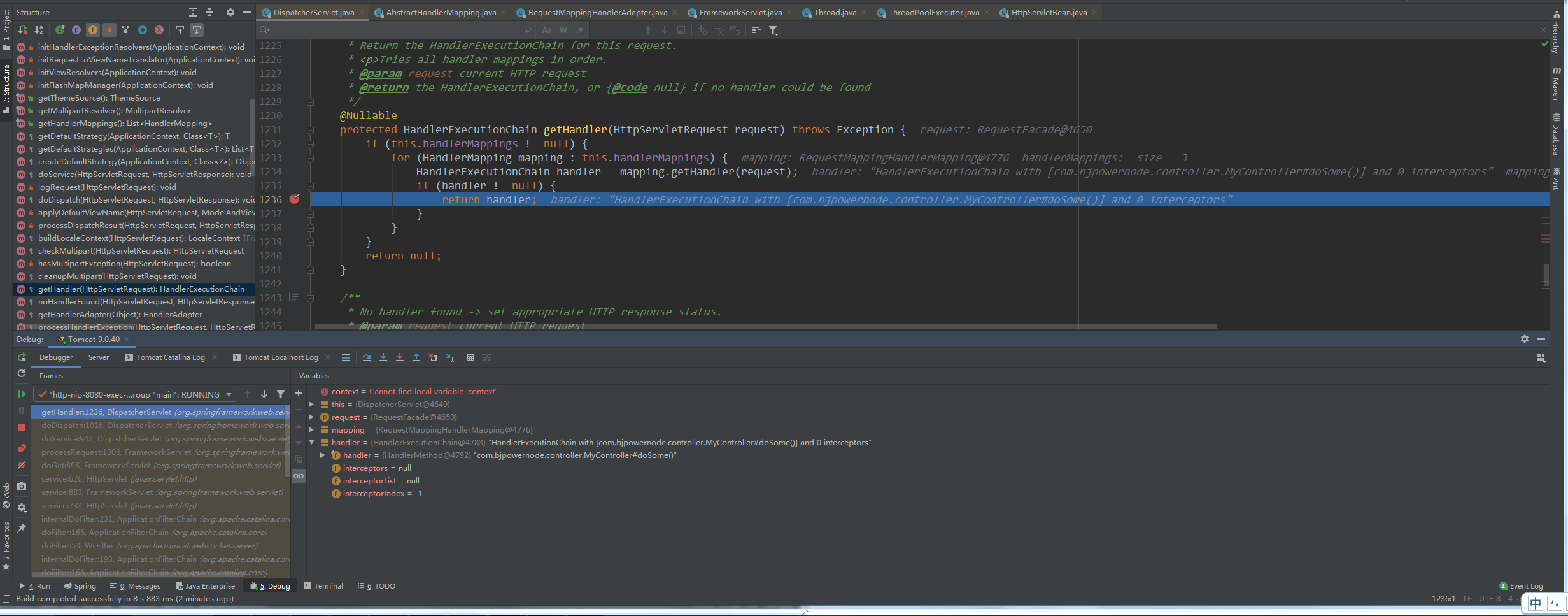
可以看到返回的Handler中,拿到的就是我们自己编码的Controller类,以及拦截器(演示项目中未编写,所以调试汇总返回的Handler最后是0 interceptors)
HandlerExecutionChain with [com.bjpowernode.controller.MyController#doSome()] and 0 interceptors

将正在调试的idea打开自己编写的Controller来对照,发现一致:
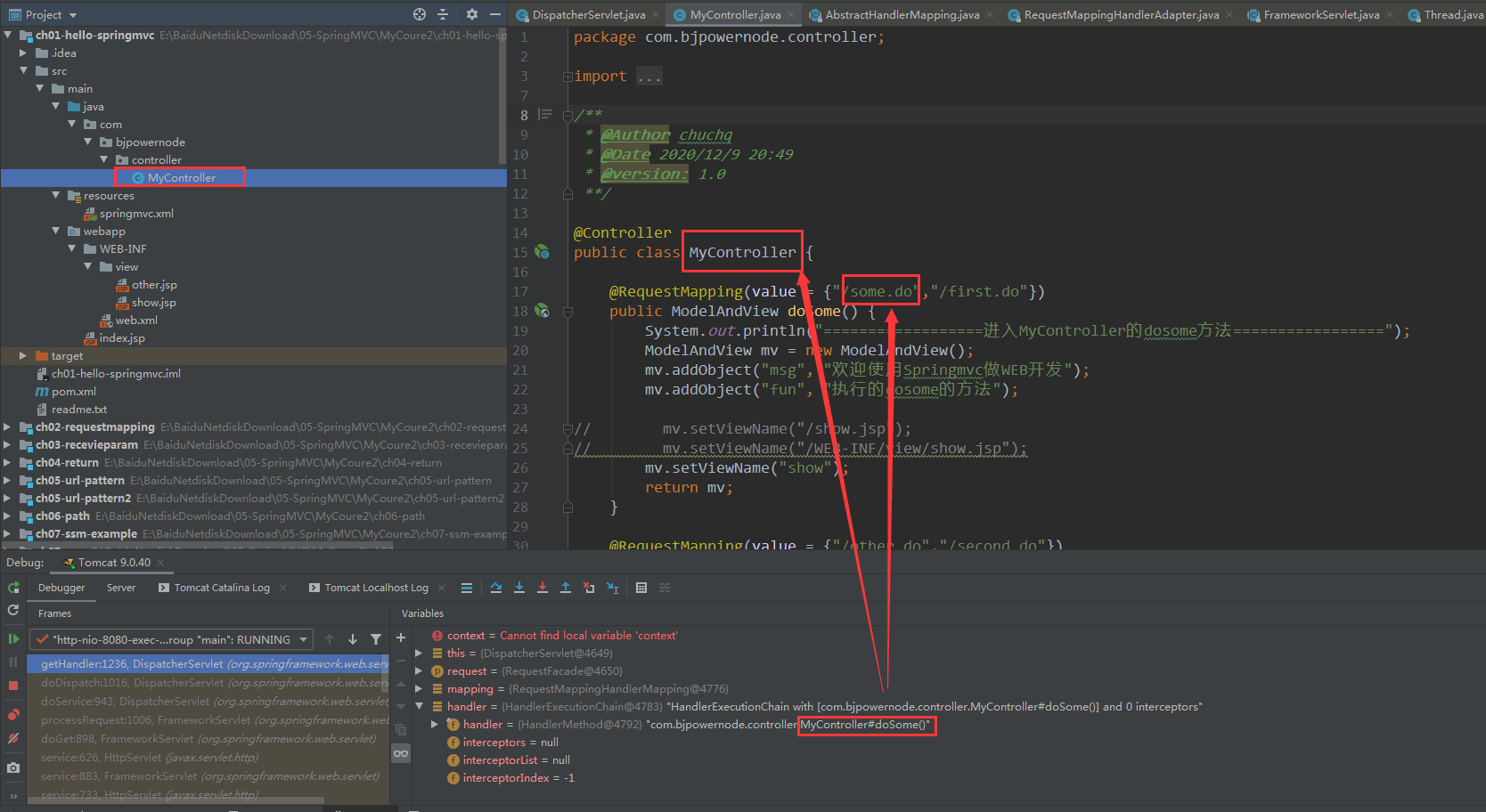
2.2、根据处理器映射器HandlerMapping返回结果调用处理器适配器HandlerAdapter
doDispatch()里面的关键代码:
HandlerAdapter ha = getHandlerAdapter(mappedHandler.getHandler());
源码如下:
/*** Return the HandlerAdapter for this handler object.* @param handler the handler object to find an adapter for* @throws ServletException if no HandlerAdapter can be found for the handler. This is a fatal error.*/protected HandlerAdapter getHandlerAdapter(Object handler) throws ServletException {if (this.handlerAdapters != null) {for (HandlerAdapter adapter : this.handlerAdapters) {if (adapter.supports(handler)) {return adapter;}}}throw new ServletException("No adapter for handler [" + handler +"]: The DispatcherServlet configuration needs to include a HandlerAdapter that supports this handler");}
为什么还要获取处理器适配器HandlerAdapter:与获取处理器映射器HandlerMapping一样,Spring提供了不通的处理器适配器。
调试如下:
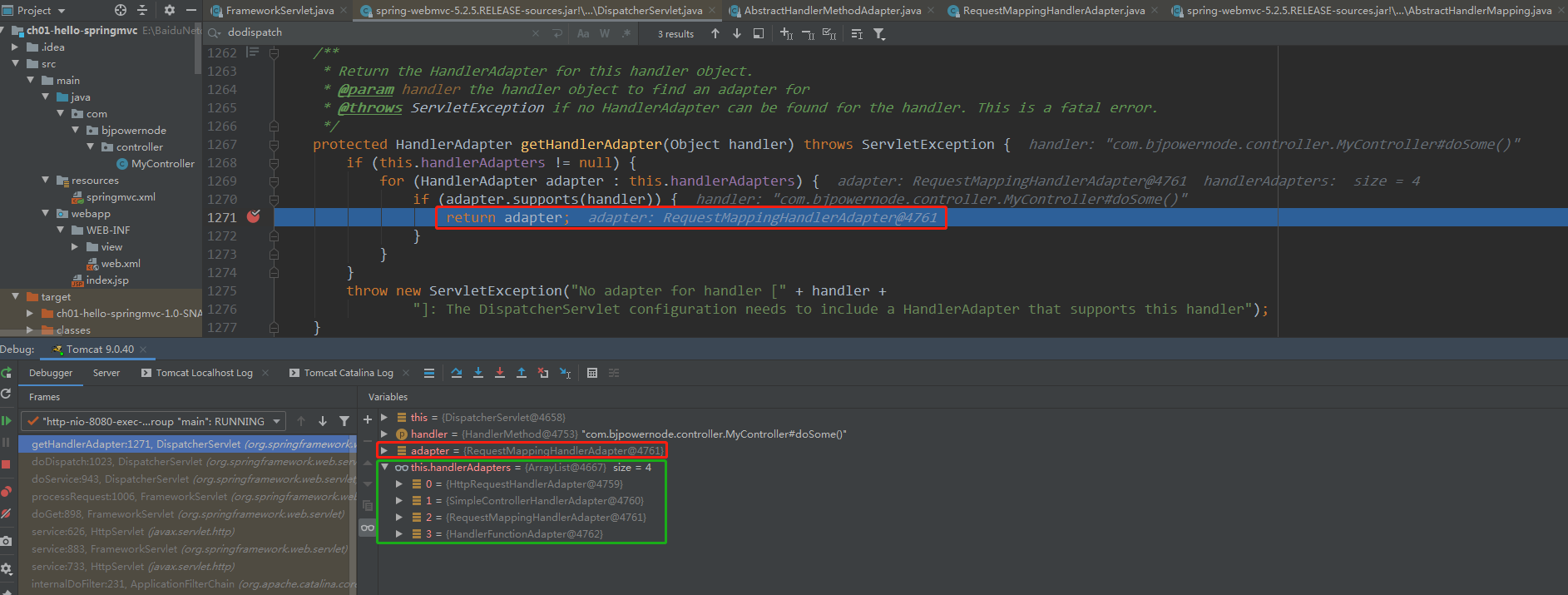
查看DEBUG调试模式中getHandlerAdapter()方法在中的:
handler、adapter、this.handlerAdapters
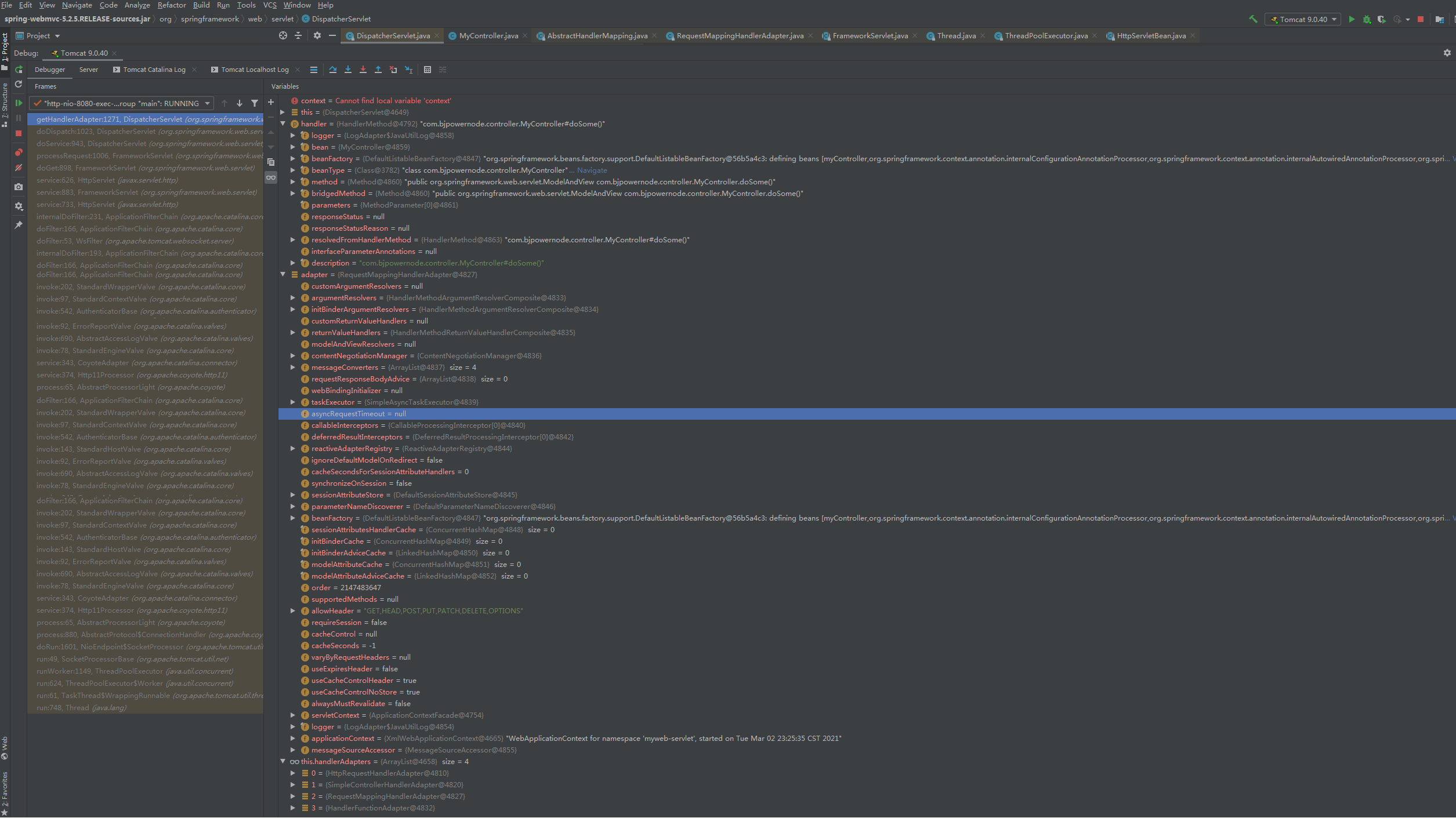
以下是拷贝的结果:
handler
handler = {HandlerMethod@4792} "com.bjpowernode.controller.MyController#doSome()"logger = {LogAdapter$JavaUtilLog@4858}bean = {MyController@4859}beanFactory = {DefaultListableBeanFactory@4847} "org.springframework.beans.factory.support.DefaultListableBeanFactory@56b5a4c3: defining beans [myController,org.springframework.context.annotation.internalConfigurationAnnotationProcessor,org.springframework.context.annotation.internalAutowiredAnnotationProcessor,org.springframework.context.annotation.internalCommonAnnotationProcessor,org.springframework.context.event.internalEventListenerProcessor,org.springframework.context.event.internalEventListenerFactory,org.springframework.web.servlet.view.InternalResourceViewResolver#0]; root of factory hierarchy"beanType = {Class@3782} "class com.bjpowernode.controller.MyController"method = {Method@4860} "public org.springframework.web.servlet.ModelAndView com.bjpowernode.controller.MyController.doSome()"bridgedMethod = {Method@4860} "public org.springframework.web.servlet.ModelAndView com.bjpowernode.controller.MyController.doSome()"parameters = {MethodParameter[0]@4861}responseStatus = nullresponseStatusReason = nullresolvedFromHandlerMethod = {HandlerMethod@4863} "com.bjpowernode.controller.MyController#doSome()"interfaceParameterAnnotations = nulldescription = "com.bjpowernode.controller.MyController#doSome()"
adapter
adapter = {RequestMappingHandlerAdapter@4827}customArgumentResolvers = nullargumentResolvers = {HandlerMethodArgumentResolverComposite@4833}initBinderArgumentResolvers = {HandlerMethodArgumentResolverComposite@4834}customReturnValueHandlers = nullreturnValueHandlers = {HandlerMethodReturnValueHandlerComposite@4835}modelAndViewResolvers = nullcontentNegotiationManager = {ContentNegotiationManager@4836}messageConverters = {ArrayList@4837} size = 4requestResponseBodyAdvice = {ArrayList@4838} size = 0webBindingInitializer = nulltaskExecutor = {SimpleAsyncTaskExecutor@4839}asyncRequestTimeout = nullcallableInterceptors = {CallableProcessingInterceptor[0]@4840}deferredResultInterceptors = {DeferredResultProcessingInterceptor[0]@4842}reactiveAdapterRegistry = {ReactiveAdapterRegistry@4844}ignoreDefaultModelOnRedirect = falsecacheSecondsForSessionAttributeHandlers = 0synchronizeOnSession = falsesessionAttributeStore = {DefaultSessionAttributeStore@4845}parameterNameDiscoverer = {DefaultParameterNameDiscoverer@4846}beanFactory = {DefaultListableBeanFactory@4847} "org.springframework.beans.factory.support.DefaultListableBeanFactory@56b5a4c3: defining beans [myController,org.springframework.context.annotation.internalConfigurationAnnotationProcessor,org.springframework.context.annotation.internalAutowiredAnnotationProcessor,org.springframework.context.annotation.internalCommonAnnotationProcessor,org.springframework.context.event.internalEventListenerProcessor,org.springframework.context.event.internalEventListenerFactory,org.springframework.web.servlet.view.InternalResourceViewResolver#0]; root of factory hierarchy"sessionAttributesHandlerCache = {ConcurrentHashMap@4848} size = 0initBinderCache = {ConcurrentHashMap@4849} size = 0initBinderAdviceCache = {LinkedHashMap@4850} size = 0modelAttributeCache = {ConcurrentHashMap@4851} size = 0modelAttributeAdviceCache = {LinkedHashMap@4852} size = 0order = 2147483647supportedMethods = nullallowHeader = "GET,HEAD,POST,PUT,PATCH,DELETE,OPTIONS"requireSession = falsecacheControl = nullcacheSeconds = -1varyByRequestHeaders = nulluseExpiresHeader = falseuseCacheControlHeader = trueuseCacheControlNoStore = truealwaysMustRevalidate = falseservletContext = {ApplicationContextFacade@4754}logger = {LogAdapter$JavaUtilLog@4854}applicationContext = {XmlWebApplicationContext@4665} "WebApplicationContext for namespace 'myweb-servlet', started on Tue Mar 02 23:25:35 CST 2021"messageSourceAccessor = {MessageSourceAccessor@4855}
this.handlerAdapters
this.handlerAdapters = {ArrayList@4658} size = 40 = {HttpRequestHandlerAdapter@4810}1 = {SimpleControllerHandlerAdapter@4820} //XML方式2 = {RequestMappingHandlerAdapter@4827} //注解方式3 = {HandlerFunctionAdapter@4832}
可以看到找到4个处理器适配器。通过DEBUG模式可以看到,此次取到的处理器适配器HandlerAdapter是:RequestMappingHandlerAdapter
ha = {RequestMappingHandlerAdapter@4827}
2.3、检查拦截器Interceptor
doDispatch()中的关键代码:
if (!mappedHandler.applyPreHandle(processedRequest, response)) {return;}org.springframework.web.servlet.HandlerExecutionChain#applyPreHandle
applyPreHandle(processedRequest, response)源码:
/*** Apply preHandle methods of registered interceptors.* @return {@code true} if the execution chain should proceed with the* next interceptor or the handler itself. Else, DispatcherServlet assumes* that this interceptor has already dealt with the response itself.*/boolean applyPreHandle(HttpServletRequest request, HttpServletResponse response) throws Exception {HandlerInterceptor[] interceptors = getInterceptors();if (!ObjectUtils.isEmpty(interceptors)) {for (int i = 0; i < interceptors.length; i++) {HandlerInterceptor interceptor = interceptors[i];if (!interceptor.preHandle(request, response, this.handler)) {triggerAfterCompletion(request, response, null);return false;}this.interceptorIndex = i;}}return true;}
2.3、处理器适配器HandlerAdapter执行Handler(Controller)返回ModelAndView
doDispatch()中的关键代码:
mv = ha.handle(processedRequest, response, mappedHandler.getHandler());
DEBUG模式调试,是跳到了:
org.springframework.web.servlet.mvc.method.AbstractHandlerMethodAdapter#handle
源码如下:
/*** This implementation expects the handler to be an {@link HandlerMethod}.*/@Override@Nullablepublic final ModelAndView handle(HttpServletRequest request, HttpServletResponse response, Object handler)throws Exception {return handleInternal(request, response, (HandlerMethod) handler);}
再往下看handleInternal(request, response, (HandlerMethod) handler)方法,
org.springframework.web.servlet.mvc.method.annotation.RequestMappingHandlerAdapter#handleInternal
@Overrideprotected ModelAndView handleInternal(HttpServletRequest request,HttpServletResponse response, HandlerMethod handlerMethod) throws Exception {ModelAndView mav;checkRequest(request);// Execute invokeHandlerMethod in synchronized block if required.if (this.synchronizeOnSession) {HttpSession session = request.getSession(false);if (session != null) {Object mutex = WebUtils.getSessionMutex(session);synchronized (mutex) {mav = invokeHandlerMethod(request, response, handlerMethod);}}else {// No HttpSession available -> no mutex necessarymav = invokeHandlerMethod(request, response, handlerMethod);}}else {// No synchronization on session demanded at all...mav = invokeHandlerMethod(request, response, handlerMethod);}if (!response.containsHeader(HEADER_CACHE_CONTROL)) {if (getSessionAttributesHandler(handlerMethod).hasSessionAttributes()) {applyCacheSeconds(response, this.cacheSecondsForSessionAttributeHandlers);}else {prepareResponse(response);}}return mav;}
注意,handleInternal(request, response, (HandlerMethod) handler)方法的返回值是ModelAndView ,这里就完成了处理器适配器HandlerAdapter执行Handler(Controller)并将结果ModelAndView返回给前端控制器DistepchServlet
2.4、视图解析器ViewResolver
接上2.3:前端控制器DistepchServlet接收到处理器适配器HandlerAdapter返回的ModelAndView以后,这里分2种情况:
- (1)、如果ModelAndView里面是逻辑视图
前端控制器DistepchServlet调用视图解析器ViewResolver通过逻辑视图查找真正的视图对象View,并返回给前端控制器DistepchServlet。 - (2)、如果ModelAndView里面是非逻辑视图:
如:MappingJackson2JsonView(把当前数据转为为JSON数据,并不需要对视图逻辑名称进行转换)
总结一下:
视图解析器ViewResolver接口主要作用是解析前端控制器DispatcherServlet传递的逻辑视图名,并将解析结果的真正的视图对象View传回给前端控制器DispatcherServlet
ViewResolverd的实现类:
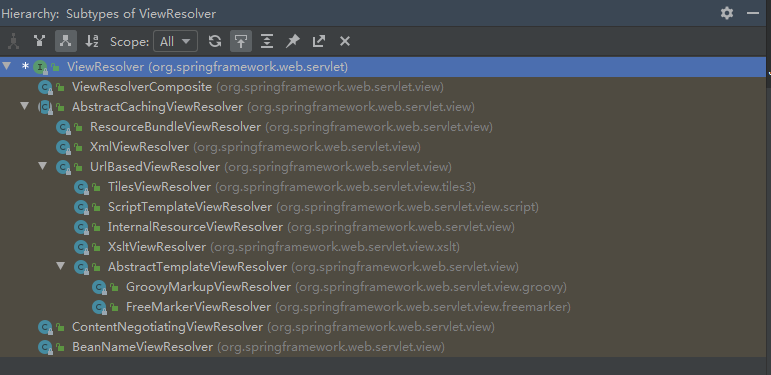
ViewResolver的UML:

2.5、视图View
2.5.1、视图对象的作用
- (1)、将控制器返回的数据处理渲染,最终返回客户端展示给用户,主要就是完成转发或者是重定向的操作.。
- (2)、为了实现视图模型和具体实现技术的解耦(指的是Spring在org.springframework.web.servlet包中定义的抽象View接口),详见2.5.2View接口图。
- (3)、视图对象View由视图解析器负责实例化。由于视图是无状态(每一次请求都会创建一个新的view对象)的,所以不会有线程安全的问题.
2.5.2、View接口图

2.5.3、View的实现类图
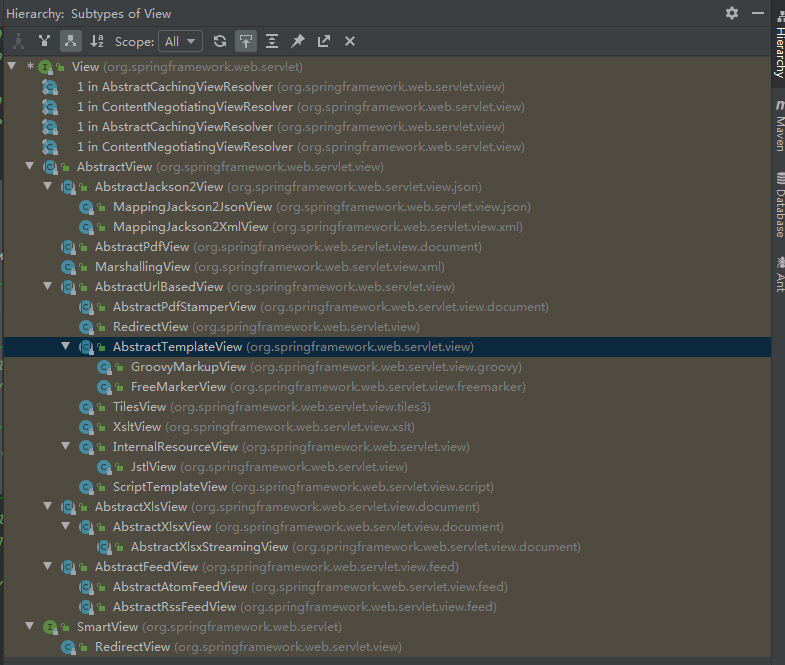
2.5.4、View的UML图
.png)
2.5.5、常用的View视图类
| 视图类型 | 简介 | |
| URL视图资源图 | InternalResourceView | 将JSP或其他资源封装成一个视图。被视图解析器InternalResourceViewResolver默认使用。 |
| JstlView | InternalResourceView的子类。如果JSP中使用了JSTL的国际化标签,就需要使用该视图类。 | |
| 文档视图 | AbstractExcelView | Excel文档视图的抽象类。 |
| AbstractPdfView | PDF文档视图的抽象类 | |
| 报表视图 | ConfigurableJasperReportsView | 常用的JasperReports报表视图 |
| JasperReportsHtmlView | ||
| JasperReportsPdfView | ||
| JasperReportsXlsView | ||
| JSON视图 | MappingJackson2JsonView | 将数据通过Jackson框架的ObjectMapper对象,以JSON方式输出 |
2.6、其他重要的点
2.6.1、DispatcherServlet.properties
DispatcherServlet.properties文件是在SpringMVC架包中:
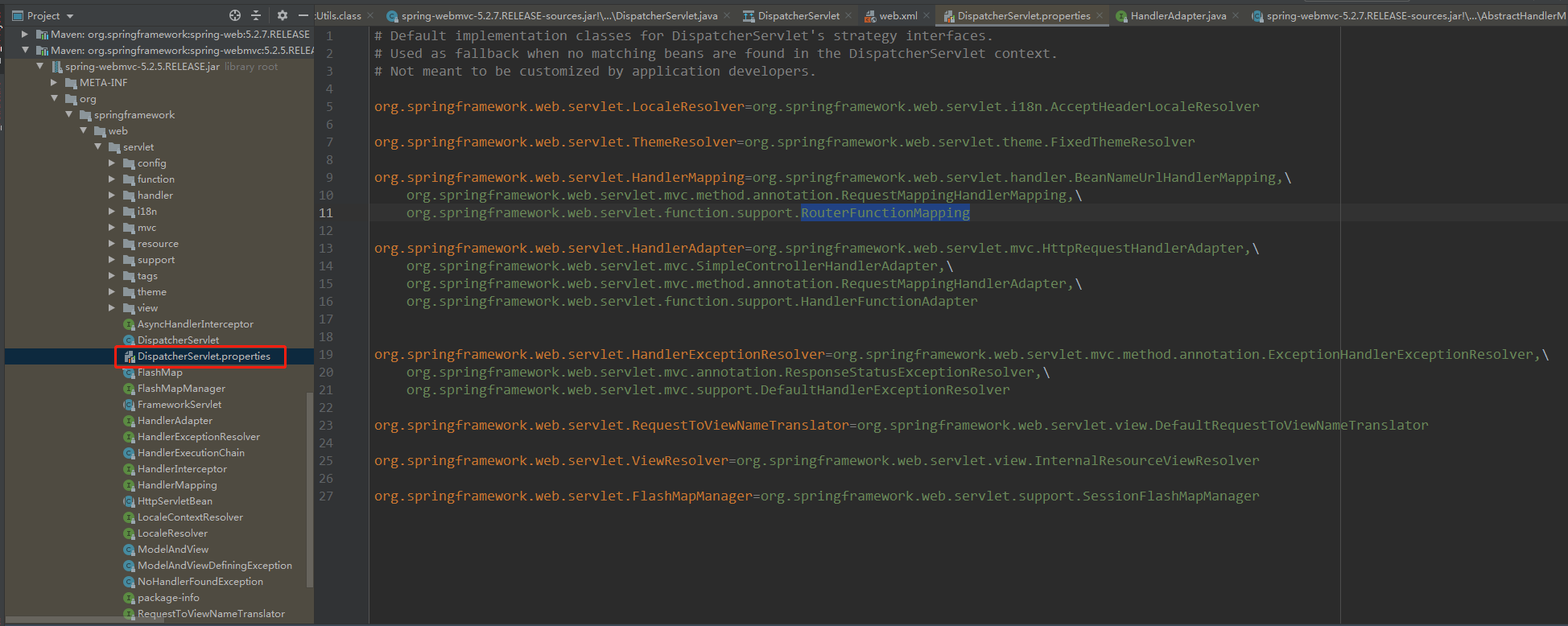
DispatcherServlet.properties内容:
# Default implementation classes for DispatcherServlet's strategy interfaces.# Used as fallback when no matching beans are found in the DispatcherServlet context.# Not meant to be customized by application developers.org.springframework.web.servlet.LocaleResolver=org.springframework.web.servlet.i18n.AcceptHeaderLocaleResolverorg.springframework.web.servlet.ThemeResolver=org.springframework.web.servlet.theme.FixedThemeResolverorg.springframework.web.servlet.HandlerMapping=org.springframework.web.servlet.handler.BeanNameUrlHandlerMapping,\org.springframework.web.servlet.mvc.method.annotation.RequestMappingHandlerMapping,\org.springframework.web.servlet.function.support.RouterFunctionMappingorg.springframework.web.servlet.HandlerAdapter=org.springframework.web.servlet.mvc.HttpRequestHandlerAdapter,\org.springframework.web.servlet.mvc.SimpleControllerHandlerAdapter,\org.springframework.web.servlet.mvc.method.annotation.RequestMappingHandlerAdapter,\org.springframework.web.servlet.function.support.HandlerFunctionAdapterorg.springframework.web.servlet.HandlerExceptionResolver=org.springframework.web.servlet.mvc.method.annotation.ExceptionHandlerExceptionResolver,\org.springframework.web.servlet.mvc.annotation.ResponseStatusExceptionResolver,\org.springframework.web.servlet.mvc.support.DefaultHandlerExceptionResolverorg.springframework.web.servlet.RequestToViewNameTranslator=org.springframework.web.servlet.view.DefaultRequestToViewNameTranslatororg.springframework.web.servlet.ViewResolver=org.springframework.web.servlet.view.InternalResourceViewResolverorg.springframework.web.servlet.FlashMapManager=org.springframework.web.servlet.support.SessionFlashMapManager
SpringMVC为什么能加载不同处理器映射器HandlerMapping、处理器适配器handlerAdapter,就是因为框架配置了这个DispatcherServlet.properties文件。
三、引用参考资料
1、引用资料
SpringMVC流程图引用地址:https://www.iqiyi.com/w_19s2gmyazh.html
SpringMVC流程图引用地址2:https://blog.csdn.net/win7system/article/details/90674757
View视图作用引用地址:https://blog.csdn.net/qq_43193797/article/details/84928603
Spring官方文档:https://spring.io/projects/spring-framework#learn/
在写此文的时候可能还有少部分是参考了其他资料,但是整理的时候我已经找不到原文出处了,如果原文作者看到,请及时联系我,我在文章中加上引用出处,谢谢!
2、参考资料
参考:w3cschool-Spring MVC 4.2.4.RELEASE 中文文档:
https://www.w3cschool.cn/spring_mvc_documentation_linesh_translation/
免责声明:
本文中使用的部分图片来自于网络(地址见:三、引用参考资料),如有侵权,请联系博主进行删除。
转载声明:
写博客不易,请尊重原作者!!
欢迎大家阅读、转载,如果是整文转载请在文章开头或者结尾处 注明 原文地址、作者,如果是大段参考请 备注 参考链接。
SpringMVC执行流程及源码分析的更多相关文章
- django Rest Framework----APIView 执行流程 APIView 源码分析
在django—CBV源码分析中,我们是分析的from django.views import View下的执行流程,这篇博客我们介绍django Rest Framework下的APIView的源码 ...
- Django 基于类的视图(CBV)执行流程 CBV 源码分析
一.CBV(基于类的视图) 视图是可以调用的,它接受请求并返回响应,这不仅仅是一个函数,Django提供了一些可以用作视图的类的例子,这些允许您通过继承或mixin来构建视图并重用代码. 基本示例 D ...
- Android应用层View绘制流程与源码分析
1 背景 还记得前面<Android应用setContentView与LayoutInflater加载解析机制源码分析>这篇文章吗?我们有分析到Activity中界面加载显示的基本流程原 ...
- Struts2请求处理流程及源码分析
1.1 Struts2请求处理 1. 一个请求在Struts2框架中的处理步骤: a) 客户端初始化一个指向Servlet容器的请求: b) 根据Web.xml配置,请求首先经过ActionConte ...
- springmvc工作原理以及源码分析(基于spring3.1.0)
springmvc是一个基于spring的web框架.本篇文章对它的工作原理以及源码进行深入分析. 一.springmvc请求处理流程 二.springmvc的工作机制 三.springmvc核心源码 ...
- springMVC容器加载源码分析
springmvc是一个基于servlet容器的轻量灵活的mvc框架,在它整个请求过程中,为了能够灵活定制各种需求,所以提供了一系列的组件完成整个请求的映射,响应等等处理.这里我们来分析下spring ...
- SpringMvc请求处理流程与源码探秘
流程梳理 dispatcherServlet作为前端控制器的主要作用就是接受请求与处理响应. 不过它不是传统意义上的servlet,它在接受到请求后采用转发的方式,将具体工作交给专业人士去做. 参与角 ...
- 服务网关zuul之二:过滤器--请求过滤执行过程(源码分析)
Zuul的核心是一系列的过滤器,这些过滤器可以完成以下功能: 身份认证与安全:识别每个资源的验证要求,并拒绝那些与要求不符的请求. 审查与监控:在边缘位置追踪有意义的数据和统计结果,从而带来精确的生成 ...
- java并发编程(四) 线程池 & 任务执行、终止源码分析
参考文档 线程池任务执行全过程:https://blog.csdn.net/wojiaolinaaa/article/details/51345789 线程池中断:https://www.cnblog ...
随机推荐
- zoj3905 Cake
Time Limit: 4 Seconds Memory Limit: 65536 KB Alice and Bob like eating cake very much. One day, ...
- 使用docker时报错“net/http: TLS handshake timeout”
问题原因 :该命令默认从docker远端镜像仓库中拉取镜像,但由于远端仓库的服务器是在国外,我们国内有的用户很可能都访问不到 解决:使用国内镜像仓库 docker pull registry.dock ...
- UWP(二)调用Win32程序
目录 一.如何构建Win32程序 二.如何构建UWP工程? 三.Samples 一.如何构建Win32程序 打开csproj文件,使用如下代码添加引用(Reference).注意,如果指定位置不存在, ...
- LSTM - 长短期记忆网络
循环神经网络(RNN) 人们不是每一秒都从头开始思考,就像你阅读本文时,不会从头去重新学习一个文字,人类的思维是有持续性的.传统的卷积神经网络没有记忆,不能解决这一个问题,循环神经网络(Recurre ...
- K8S(04)核心插件-coredns服务
K8S核心插件-coredns服务 目录 K8S核心插件-coredns服务 1 coredns用途 1.1 为什么需要服务发现 2 coredns的部署 2.1 获取coredns的docker镜像 ...
- KafkaConsumer 简析
使用方式 创建一个 KafkaConsumer 对象订阅主题并开始接收消息: Properties properties = new Properties(); properties.setPrope ...
- hdu 4497 GCD and LCM (非原创)
GCD and LCM Time Limit: 2000/1000 MS (Java/Others) Memory Limit: 65535/65535 K (Java/Others)Total ...
- js sort tricks All In One
js sort tricks All In One js 排序技巧 const arr = [ { label: 'False 1 ', disabled: false, }, { label: 'F ...
- 如何在Python 中使用UTF-8 编码 && Python 使用 注释,Python ,UTF-8 编码 , Python 注释
如何在Python 中使用UTF-8 编码 && Python 使用 注释,Python ,UTF-8 编码 , Python 注释 PIP $ pip install beauti ...
- Chrome new features preview
Chrome new features preview CSS Overview https://css-tricks.com/new-in-chrome-css-overview/ capture ...
